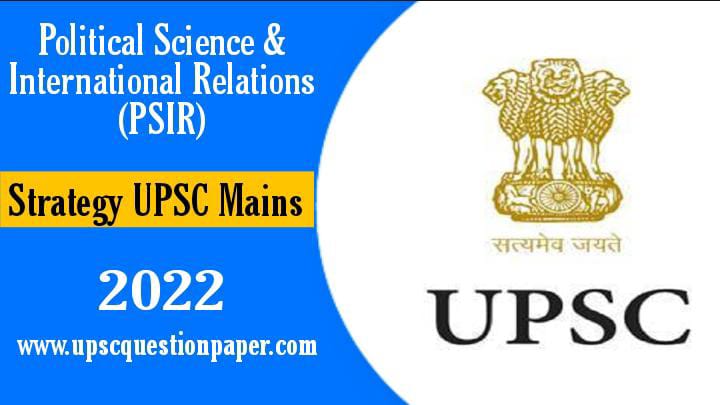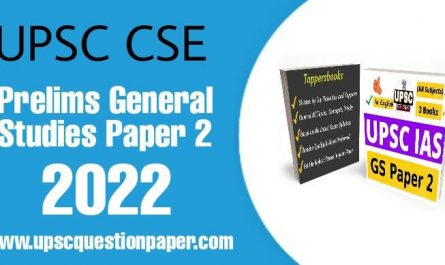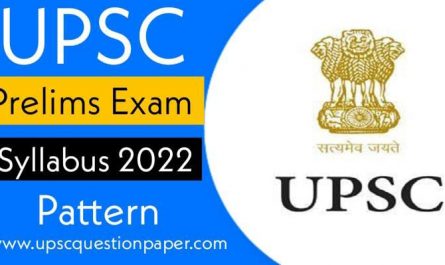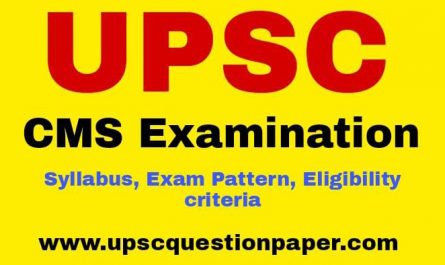Table of Contents
Political Science & International Relations (PSIR) Optional Strategy for UPSC Mains
In this article, we are trying to cover sources of reading PSIR optional for UPSC Mains Exam. No one in the world can give you any foolproof strategy to get success with any of the optional papers. But, consistent effort in any field gives results. In all UPSC success stories, a few things are very common such as diverse reading, disciplined approach, time management, etc.
Political Science & International Relation (PSIR)
The syllabus of PSIR optional is divided into two papers over 4 broad categories:-
Paper-I
- a) Political Theory
- b) Indian Politics & Government
Paper-II
- c) Comparative Politics & International Politics
- d) India’s International Relations
It would be easy to plan your preparation schedule if you will divide your complete PSIS syllabus into small capsules.
PSIR Optional-Paper-I Strategy
Nature of PSIR Optional Paper-One:
- Paper is more static in nature.
- Conceptual clarity of theory is very important.
- Direct questions are being asked.
- Answers can be enriched with contemporary views.
- Multiple revisions will be the essence of success.
I would suggest you divide PSIR Optional Paper one into five capsules as given.
Paper-1 |
||
| Time to be devoted: | Part-I- One Month
First Reading-15 days Revision-15 days |
Part-II-One Month
First Reading-15 days Revision-15 days |
| Total Capsules: | i. Political Theory,
ii. Indian Political Thought, iii. Western Political Thought and iv. Political Ideologies.
|
v. Indian Government and Politics
|
Capsule one-Political Theory:
Relevance of Political theories:
- Political theories give answers to tough political questions
- Allows one to think about the relationship of government with people
- Helps to examine Governments’ priorities
Strategy for Capsule One: Political Theory
You should start your preparation by reading “Political Theory” by Andrew Heywood. Of course, it is a book by a foreign writer but it is a very good book for conceptual clarity. PSIR subject demands your clarity of concepts for interrelating them with events. Read all basics like equality, Rights, Power, Liberty Democracy, etc. very thoroughly.
Give a patient coverage to the book and read topics mentioned in the syllabus of the UPSC exam. Once you cover it successfully, you should give a selective reading to O.P.Gauba. This book will be helpful only after finishing Andre Heywood. While reading O.P.Gauba, you would feel that it is complementing Heywood. A a few places, you will find Gauba has covered better.
Capsule Two: Political Ideologies:
Relevance of Political Ideologies:
- All government policies are a reflection of political ideology
- Provides an explanation as well as a description of the political phenomenon of the country
- Helps in a selection of the political goals and actions for a community
Strategy for Capsule Two Political Ideologies:
Political Ideologies by Andrew Heywood is a gift from Heaven. Don’t waste your time for looking a better book. However, you can keep Gandhism to cover in the fourth capsule i.e. Indian Political Thought.
Capsule Three: Western Political Thought:
Strategy for Western Political Thought:
Can read History of Political Thought from Plato to Marx by Mukherjee. Brian Nelson is considered a good source for the portion but Gramsci and Hannah Arendt are missing in this book. This book covers some ideologies too.
You can read O.P. Gauba’s Political Theory for Gramsci and Hannah Arendt
Capsule Four: Indian Political Thought:
Strategy for Indian Political Thought:
If you have command over the English language you should read V.R.Mehta’s book for the portion. Though few topics like Ambedkar and Syed Ahmed Khan are missing, which you can cover from IGNOU PDFs.
Few toppers also suggest reading the original texts of “Annihilation of caste” and “Hind Swaraj”.
Capsule five: Part B of Paper-I
Strategy for Indian Government and Politics”
This section overlaps a lot with the UPSC Syllabus of GS I and II, but its preparation strategy should be different. You cannot write a general answer in your optional subject. You need to have a remarkable command over Current Affairs to do better than others.
Recommended Readings:
Laxmikanth (Avoid 3rd edition as there are few printing mistakes)
Bipin Chandra India before Independence
Modern India Political Thought by Bidyut Chakraborty
Introduction to the Constitution of India – D D Basu
Indian Polity – B. L. Fadia
Yojana,
Kurukshetra
PSIR Optional Paper-2 Strategy
PSIR Optional Paper 2 Section A -Comparative Politics & International Politics
Dynamic as well as static in some sections. Need time to fully grasp the concepts, as they can get a bit confusing at times.
Recommended Readings:
IGNOU MA Notes
Andrew Heywood
Internet for a selective study like WTO, UN.
Globalization of World Politics.
V.K.Malhotra’s “International Relations” (selective reading )
PSIR Optional Paper 2 Section B-India’s International Relation
More or less ALL about current affairs, with some links to static stuff. For International Relations
- Reading Newspaper is the best source for this portion.
- Don’t underestimate the relevance of the Internet in the IAS preparation of PSIR.
- Visit the MEA website to read India’s relations with countries in news.
- Though this paper is more dynamic after analyzing the last pear papers you can find a few static portions also. For ex- Questions of NAM-Non Alignment Movement.
Suggested Readings: Some basic books for foundation building should be read.
Challenges and Strategies – Rajiv Sikri
Can the Elephant Dance? – David Malone
Other sources
PSIR by N.D.Arora
Heywood series
Hindu,
Diplomat,
RSTV Videos (India’s World)
Mahroof Raza special on Times Now,
BBC,
Economist,
Wall Street Journal
Institute of Defence Studies and Analyses (IDSA) website
Selective study of certain editions of World Focus magazine
Read More…



